Navigating Private Charters: Your Vademecum for Exclusive Boat Rentals
- 6710
- 2
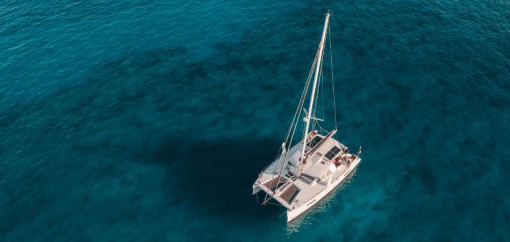
- What does an exclusive use boat cruise involve?
- How do you conclude a boat rental contract for exclusive use?
- Delivery of the vessel and rental conditions
- What is the Security Deposit and why is it necessary for renting a private boat?
- Licensed rental or crewed rental?
- What are the rights and duties of the skipper on board?
- What are the rights and duties of a Hostess/cook on board?
- The Galley and its Organization
- How to spend a typical day on board
- Terms and conditions to check before booking
Intersailclub offers a careful selection of sailing boats, catamarans, yachts, and gulets, providing a wide range of nautical charter formulas to choose from. Among these options, the exclusive use booking formula is included, available both with and without crew. Through this concise guide, we aim to answer the most common questions relating to renting a boat, regardless of the model, for an exclusive use experience.
What does an exclusive use boat cruise involve?
Booking a boat, whether sailing, catamaran, gulet, or motor, for exclusive use, implies that the vessel will be entirely at the lessor's disposal during the agreed period. The lessor books the exclusive use of the boat, and during the duration of the rental, access on board will be reserved exclusively for people authorized by them and identified via a crew list. The rental of the vessel can take place with or without a crew. In most cases, boats rented for exclusive use are offered in "bareboat charter" mode, i.e. without crew on board. In case the lessor of the vessel has a nautical license, he will be authorized to take command of the vessel without the presence of a professional commander/skipper on board, should the lessor be unable to navigate the boat, then it will be possible to hire a licensed captain at an extra fee.
How do you conclude a boat rental contract for exclusive use?
The conclusion of a rental contract for the exclusive use of a boat involves several steps and requires a written formalization, both for legal reasons (the boat cannot leave the port without a regular rental contract) and to prevent possible future disputes.
Below, we outline the different sections of the contract:
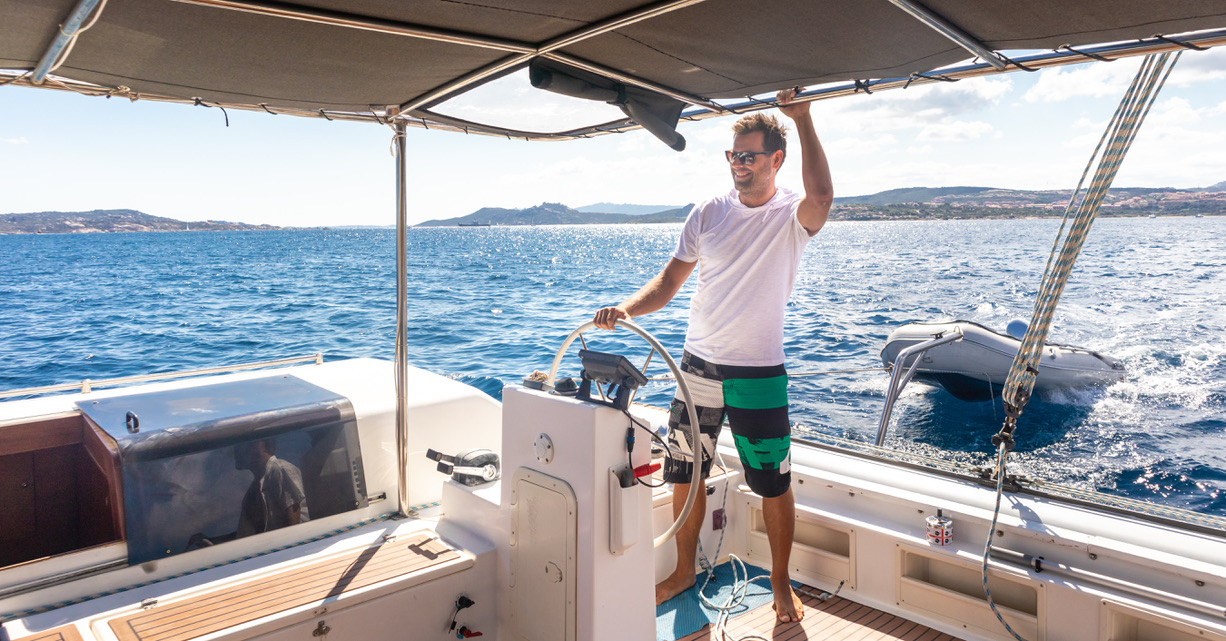
Identification of the parties: includes the personal identification data of the owner of the boat and of the person who intends to rent the boat as well as the data of the designated captain.
Description of the boat: i.e. the identification data of the boat, including license plate and name.
Duration of the contract: Specifies the duration of the rental, including the date and time of the start and end of the rental, as well as the harbor where the boat will be picked up and brought back by the lessor.Delivery and return of the boat: Defines the details on the delivery of the boat to the lessor at the beginning of the contract and on its return at the end of the contract.
Price and payment: Indicates the amount of the rental fee and the dates the payments will be due.
Security deposit: an amount left by the renters as a guarantee for any damages. The contract includes the amount, the conditions for its reimbursement, and the circumstances in which it could be withheld.
Obligations of the parties: in general the terms and conditions and therefore the duties and responsibilities of the parties before, during, and after the rental period.
Cancellation terms: Establishes the conditions for cancellation by both parties and any refunds expected.
Signature: the contract drawn up with all the necessary details is signed by: the lessor, the owner, and the captain. A copy of the contract is given to all parties for future reference.
In the case of rentals for exclusive use, the contract is stipulated directly between the owner of the boat and those who intend to rent it; tour operators or intermediaries will not figure in the contract. It is essential to underline that it is forbidden to leave the harbor without a regular rental agreement.
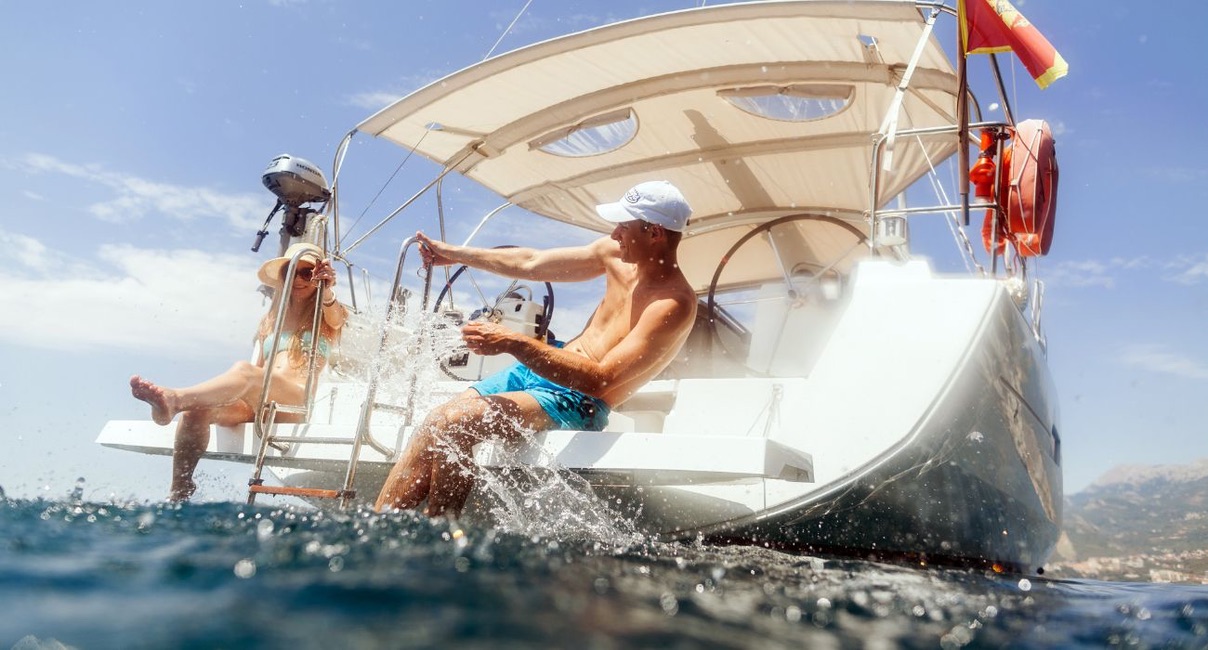
Delivery of the vessel and rental conditions
Rental boats are delivered with standard equipment, including safety equipment, kitchen equipment, basic furnishings, etc. (of which it is always possible to request a detailed list). The tanks, both water and fuel, will be full, and the lessor is required to return the vessel in the same condition in which it was taken. The lessor assumes responsibility for the boat, the people on board, and the crew. To guarantee this commitment, renting a boat for exclusive use requires a security deposit, the monetary value of which is determined by the insurance deductibles. This deposit is to cover any damage, loss of equipment, or fines that may occur during the rental period of the boat.
What is the Security Deposit and why is it necessary for renting a private boat?
The Security Deposit is an essential component in the rental of a private boat and plays a crucial role in ensuring the safety of the vessel and the responsibility of the lessor. Boats intended for pleasure charter are required by law to be insured to cover both damage to the boat itself ("all risk" coverage) and damage to third parties (Civil Liability Insurance). However, these insurance policies have a deductible, i.e. a sum of money that remains the responsibility of the lessor in the event of damage, as well as excluding certain types of damage, similar to what happens with car insurance.
The Security Deposit is intended to cover this deductible and any overdrafts not included in the insurance policies. This deposit can be provided in several ways but usually requires the owner to pre-authorize your credit or debit card (prepaid cards of any kind are not eligible). The value of the Security Deposit varies depending on the size and model of the yacht but is typically between €1,500 and €5,000. This practice is to ensure that the lessor has financial responsibility in the event of damage to the vessel during the rental period.
Important: it is essential to underline that the Security Deposit does not constitute an actual payment, but rather a temporary block of the amount on the lessor's credit or debit card. Therefore, bank transfer is not an acceptable method of guaranteeing the security deposit, as this practice is based on pre-authorization and not on an actual transfer of funds.
Release of the Security Deposit
The security deposit will be released upon disembarkation and final check-out of the boat provided that no damages, losses, or fines have occurred during the charter rental period (the timing of the release depends on the card’s bank and may vary). However, if damage occurs and insurance needs to be involved, or if a repair quote is not immediately available, the timing of the release of the security deposit may be significantly delayed. In situations where insurance coverage is necessary or where it is impossible to quickly obtain a repair quote, it is often advisable to try to reach an immediate agreement with the parties involved or contact your agency for assistance in resolving the problem.
Responsibilities of the Lessor
The lessor of the vessel, i.e. the person who signs the contract or rental agreement, assumes full responsibility for any damage, loss of equipment, or penalties that may occur during the rental period. This aspect is particularly relevant in bareboat lease agreements. However, the liability also extends to damage caused by the hired crew, since the personnel are employed by the lessor and not the owner of the vessel. Therefore, the lessor will be held liable for any damage caused by the staff, reserving the possibility of resolving with them the matter amicably or through legal means, if an agreement is not reached.

What is Security Deposit Insurance (Damage Waiver)?
Damage insurance can be purchased to limit the maximum amount the tenant can be charged for damage and loss of equipment. Typically, the cost of insurance is 10% of the security deposit and must be paid upon boarding. This amount is non-refundable and does not constitute an advance for damage or loss occurring during the rental period, but represents the cost of insurance to reduce the security deposit, usually to 20% of the initial amount.
Licensed rental or crewed rental?
Having a license is not always an essential requirement! For example, for boats such as dinghies, small motor boats, and sailboats under 10 meters or with less than 40 HP, a license is not mandatory. However, for medium and large sailing boats, catamarans, and motor yachts, a sailing license is required to take command. Furthermore, gulets and large motor yachts are usually rented exclusively with crew on board.

When is it appropriate to request a Skipper on board?
If the lessor does not have a nautical license, it is their responsibility (possibly with the assistance of their travel consultant) to identify the person or persons (in case they also opt to hire a hostess, cook, or sailor's hand) equipped with the necessary skills to operate the vessel. The costs associated with these services vary based on several factors, similar to variations in the yacht models themselves.
Typically, hiring a professional captain for a week ranges between €1,100 and €1,600, depending on the size of the boat and the period. Similarly, hiring a hostess/cook or steward/cook will cost between €900 and €1,300.
What are the rights and duties of the skipper on board?
The skipper's duties include managing the boat and sailing equipment, assisting in booking berths (excluding advance payment), and planning the itinerary, which may be modified at their discretion based on weather conditions or local circumstances (such as overcrowding of a bay, for example). The skipper must have a good knowledge of the operation of the boat's equipment, although they are not required to carry out complex repairs. The skipper takes care of launching the support dinghy, provides assistance to guests for descent and ascent in the auxiliary inflatable boat, offers advice on the safety of operations on board, and uses the dinghy to transport guests ashore. They are also responsible for monitoring the levels of water, fuel, and residual charge of the service batteries, and are thus allowed to set limitations to the use of said resources on board and schedule stops in port to restore the correct values. Furthermore, the skipper provides information on the management of the galley, considering the spaces on board and correct stowage, and planning meals based on navigation times and the safety of guests. Even with a professional skipper on board, minimal participation in maneuvering the boat is required, especially in situations such as mooring/unmooring or sailing with a stronger wind.
The skipper does not take care of routine activities such as shopping, cooking, cleaning, or keeping the boat in order, including waste disposal, except his cabin/toilet and his personal effects. As a professional hired for their expertise and services, the skipper does not contribute financially for on-board consumables like galley, fuel, water, and port taxes, expenses which are the responsibility of the charterer and his guests.
Despite these specific roles, there are exceptions, with skippers who might offer extra support, such as helping in the kitchen or with daily tasks, fishing, or playing an instrument on board.
As a rule, the skipper does not participate in breakfasts, lunches, dinners, or aperitifs on land. However, if you decide to invite them, it is customary for them to be a non-paying guest. For the last evening, it is also common practice to organize a farewell dinner with the entire crew, offering the meal to the onboard staff. As for tips, they are not necessarily expected. However, at sea, as a sign of recognition for helpfulness, and professionalism and for helping to make the trip a pleasant experience, a tip to the crew is quite common practice.
Use of the Dinghy
Generally speaking, the use of the dinghy is mainly reserved for the skipper. This is because the skipper, who must remain constantly on board the vessel, especially when it is not moored in a safe port, must be able to move independently after transporting guests ashore. Usually, the standard time slot for trips with the dinghy is from 08:00 to 23:00; any use outside these hours is considered an extra service to be agreed with the skipper, always respecting common sense and the rest and wake times necessary to guarantee full awareness during navigation. It is important to underline that the skipper's work is not limited to the specific dates of the holiday rental period, but extends throughout the entire summer season.
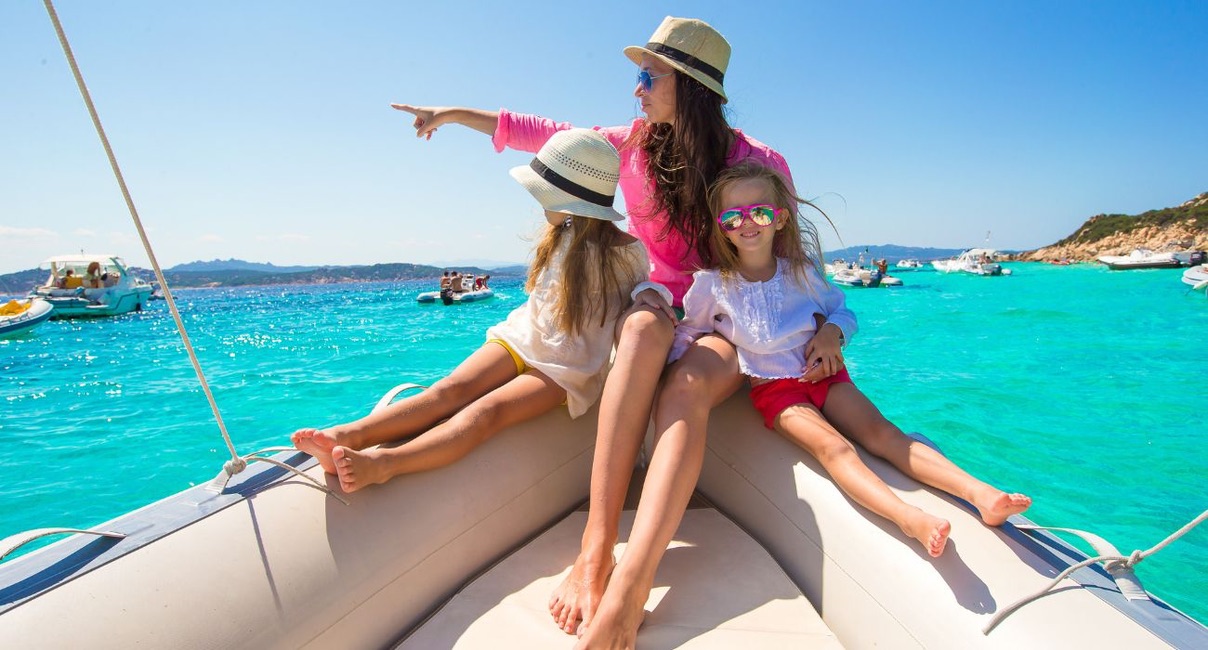
What are the rights and duties of a Hostess/cook on board?
The Hostess/cook on board plays a crucial role in ensuring a high-quality cruise. Her responsibility extends to the complete management of the kitchen on board, including shopping, meal preparation, cleaning, and waste disposal. Furthermore, she contributes significantly to maintaining order in common areas.
Depending on the size of the vessel, the crew can vary from a minimum of 2 members, as in the case of a Captain/Hostess, to 3/4 members or more, offering a complete 5-star level service. However, on luxury cruises with more than two crew members, the composition of the crew will be more substantial, including from 3 to many members, and included in the services offered there will also be the daily cleaning of the cabins, room service, and the presence of an on-board bar.
In charters with just 2 crew members, guests will be responsible for keeping their cabins tidy, and the crew will just check that everything is working properly in the bathrooms (not cleaning but just a technical check) during appropriate moments of the cruise. A cooperative attitude from guests, especially in moments of greater commitment for the crew, such as during maneuvers or meal preparation, is welcome and helps ensure a pleasant and smooth cruise for everyone on board.
During stops, the hostess/cook or the captain can assist guests in organizing activities on land, further expanding her role beyond culinary skills and helping to maintain a climate of conviviality on board. It is important to note that, although the hostess/cook is responsible for preparing meals and appetizers on board, this does not mean that guests should overload her with excessive or continuous requests for long culinary preparations (nor continuously ask to be served beverages that are easily accessible). Her presence is aimed at ensuring a pleasant and quality gastronomic experience, but it should be kept in mind that a boat is not a restaurant with dedicated staff. A boat offers a more informal environment and the active participation of guests in life on board, including sharing small tasks or collaborating during activities (like setting the table), will contribute to creating an experience more fulfilling for everyone on board.
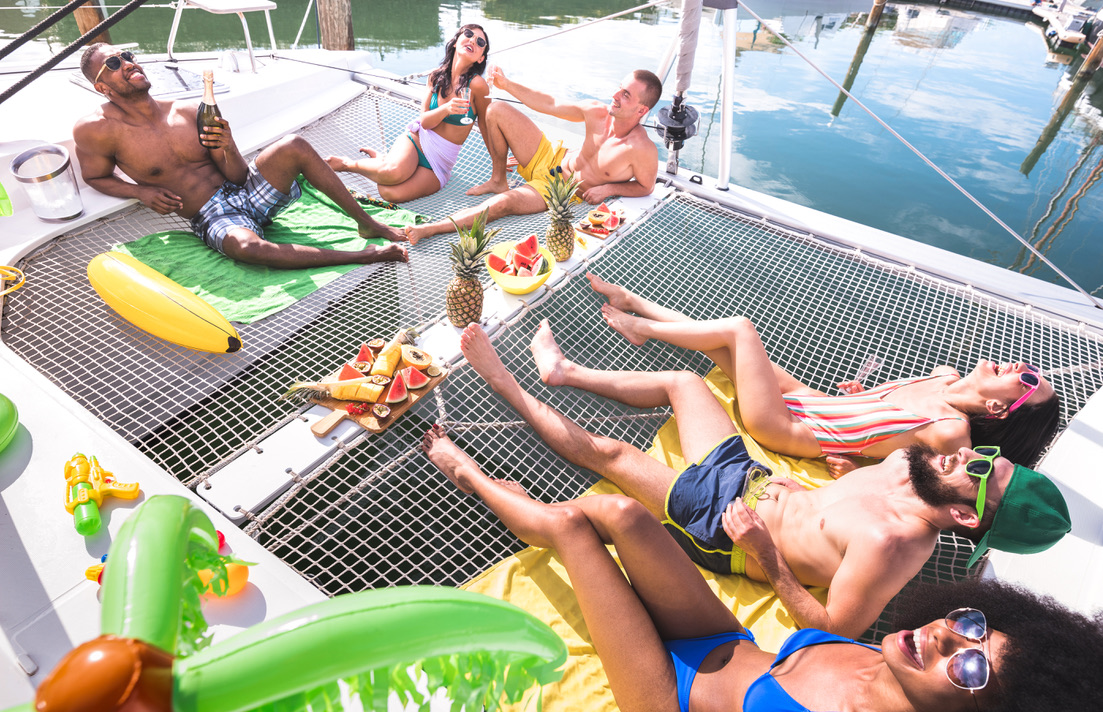
The Galley and its Organization
The galley represents the supply of food and drinks that is prepared before departure and replenished during the cruise, possibly enriched with typical products of the places visited. Basic products, such as water, detergents, and some food for essential preparations, are purchased at the beginning of the holiday. It is important to note that boats intended for nautical charter, mostly rented as bareboat, are not furnished with food, drinks, or cleaning products. The purchase of products for the galley is the responsibility of the lessor and his guests.
These can manage the supply through the paid service of a local supermarket, with the assistance of specialized personnel, such as a hostess/steward/chef, or in complete autonomy.
The APA in Nautical Leasing
In nautical jargon, "APA" is an acronym for "Advance Provisioning Allowance" or "Advanced Provisioning Agreement". This term is common in rental agreements, especially for luxury vessels. The APA represents a sum of money advanced by the charterer to the owner of the vessel. This amount covers expected expenses during the cruise, such as fuel, moorings, food, drinks, provisioning costs, and other operational expenses. Usually calculated as a percentage of the total rental cost (generally around 20-30%), the APA guarantees that all expenses will be covered during the rental period. Any unused funds are returned at the end of the lease, while if expenses exceed the APA, the tenant is responsible for covering the difference.
How to spend a typical day on board
The day on a boat follows a relaxed and pleasant pace. You start the day by waking up in a beautiful bay, ideal for a morning dip before breakfast. You can choose to go ashore with the dinghy for a short walk or, if moored near a town, to have breakfast on land. Next, the boat will move towards the next stop, sailing distances are for the most part brief, though longer distances may also be covered if need be to reach the next anchoring. Sailing is an integral part of the experience, offering unique moments during your holiday. During the day you will have time for snorkeling or exploring the vicinity, both by sea and on land, discovering beaches, trails and picturesque villages. After lunch and a short afternoon break, the second leg of the day will start, anchoring in a harbor or near a picturesque village under the stars to spend the night. Depending on the itinerary, you can plan stops in fascinating villages or enchanting bays. The aim is to vary the holiday day by day, offering the possibility of enjoying aperitifs and dinners on land, to later return on board.
Responsible Use of Water and Electricity on Board
Water and electricity are crucial resources on board, especially when you are away from ports or in high season. Restocking can take up valuable time, so it's essential to use both sparingly. Sailing vessels usually carry a limited amount of freshwater, which can quickly run out if used without care. (The more luxurious boats, however, have larger tanks and often have on-board desalinators.) On board, 12-volt power can be accessed via USB or cigarette lighter sockets. The 220-volt current is available through an inverter with limited power, to be used carefully based on the battery charge or, in luxury boats, through a generator. Both types of sockets can be present in the cabin or only in the dinette, depending on the model of the boat. The use of hair dryers is only permitted when the boat is docked or there is a generator on board.
Air Conditioning on Board
It is essential to note that the use of air conditioning may vary depending on the model and type of vessel. Some boats allow extended use of air conditioning, providing greater comfort in case of extreme heat conditions. However, other vessels may require more specific and limited conditions to activate the air conditioning. The availability and methods of use of this service will be determined by the specifications of the boat booked. In some boat models, especially sailing boats, the air conditioning may not be accessible during navigation, thus limiting its use. Furthermore, for energy-saving reasons and to avoid noise pollution, there will be times when air conditioning may not be available. Usually, its use is only foreseen on particularly hot days and for a limited period, as also specified in the rental contract. This consideration is particularly relevant in the case of all-inclusive charters.
Sleeping on a boat
Sleeping on board offers various options, each with its particularities. Usually, aft cabins have a wider layout and stability on waves although this is not a hard and fast rule. On the other hand, bow cabins, while smaller, tend to be more ventilated, and if you like quiet, being far from the main cockpit they are generally quieter. Ultimately, all of them are comfortable and will guarantee peaceful nights. You will easily get used to the smaller size compared to a hotel room. It is important to consider that you will spend very little time in the cabin. The real attractions of the holiday will be the sea, sailing, and the places to explore. Life outdoors, the company of friends, and the beauty of the journey will be the true protagonists of your experience on board.
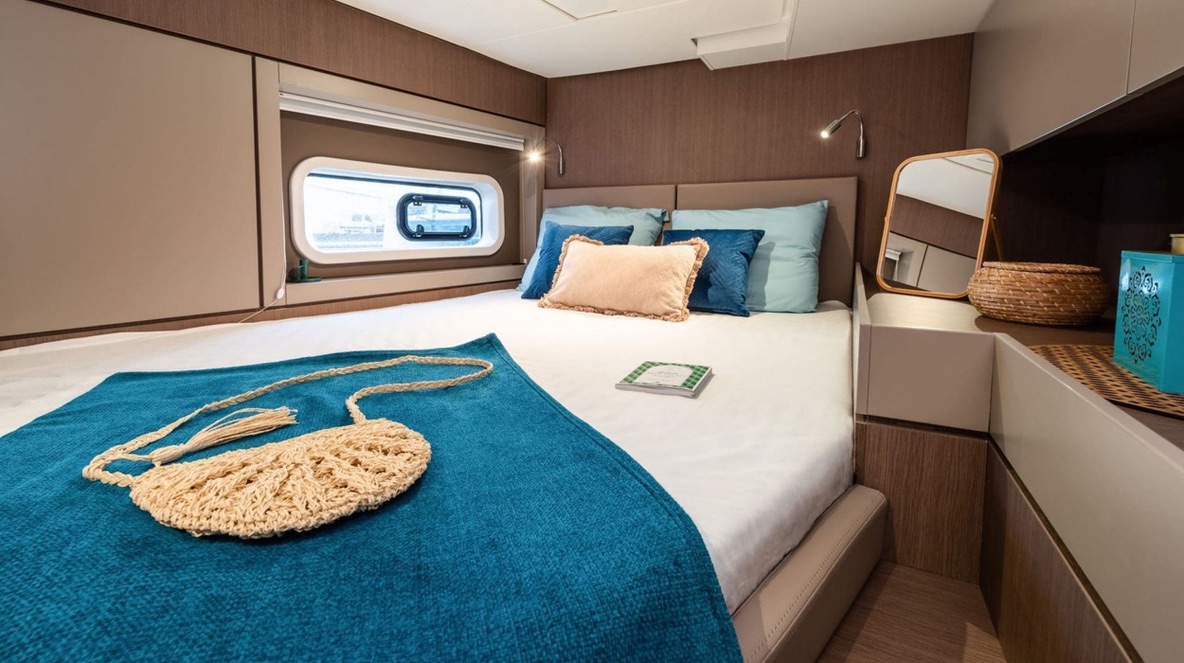
Toilet System On Board
On all sailing boats, the toilet has a familiar appearance, but its operation is significantly different from the domestic one. On board, there is no traditional flush; the water is drawn back and eliminated through a manual or electric pump, discharging everything outside. For safety reasons, the system pipes have a very small diameter, so it is essential to avoid throwing toilet paper, sanitary napkins, or other objects down the toilet. In the event of accidental falls, it is essential to remedy them without activating the pump to avoid damage to the system. Any damage may result in financial penalties. For safety reasons, during navigation, the valves that allow the flow of water must always be closed and opened only for the time strictly necessary. The skipper or on-board staff will provide detailed instructions on how to operate the toilet.
Sailing
The first sailing experience arouses mixed sensations. You enter a world completely different from the everyday one; time seems to expand and the mechanical noise of the propulsion disappears, but the boat moves. Sailing times vary from six to eight knots under power and can be similar under sail. Sailing is an integral part of the holiday, not just a journey. Turning off the engine and moving with the wind means being in harmony with nature.
Adverse Weather Conditions
Weather variations are an integral part of the sailing experience. Itineraries may vary based on weather conditions, with the possibility of sudden changes. In case of bad weather, safety is a priority. The captain monitors the weather forecast daily and, in case of adverse conditions, evaluates whether to stay in port, change bay, or take other measures. In case of bad weather, don't be discouraged; it's part of the adventure! Other shore activities will be available to continue enjoying your vacation.

Tips on what to pack in your suitcase
The key to packing your suitcase is to keep it to a minimum, opting for flexible bags that can be easily stowed. Foldable bags or fabric trolleys are ideal choices. Space on board is limited, regardless of the size of the vessel. You don't need to bring a lot of clothes; swimsuits and sarongs will be the main attire. If you love trekking, consider the necessary clothes, while equipment such as boots and helmets can be rented on shore. For evenings ashore, something elegant is recommended. Shoes are not permitted on board (except shoes with soft white soles for boat use only).
For sports equipment, check availability on board or ask if it is possible to bring it as an extra. Remember to bring sunscreen and sunglasses, something warm to cover yourself in the evening, and an eye mask for the morning light if you need total darkness to enjoy your sleeping time, as the cabin can never be completely covered by the sunlight coming in.
Terms and conditions to check before booking
As with any other type of travel, it is good practice to read the terms and conditions. Especially if at the first experience there are some contractual aspects to keep in mind in case of need. Here are some examples to be considered for information purposes only, we recommend reading the general terms and conditions completely before booking (the terms and conditions must be signed for acceptance).
Itinerary
Regarding the itinerary, it is always variable due to weather conditions and other factors relating to the navigation itself, the safety of the participants, and more. For this reason, changes to an itinerary can never be subject to a full or partial refund. In the case of boats for exclusive use, the detailed itinerary is decided by the lessor, together with the captain (in the case of paid crew). The itinerary must always take into account the factors of legality, safety of the vessel and people, and times for returning the vessel to the port, on the agreed day and time.
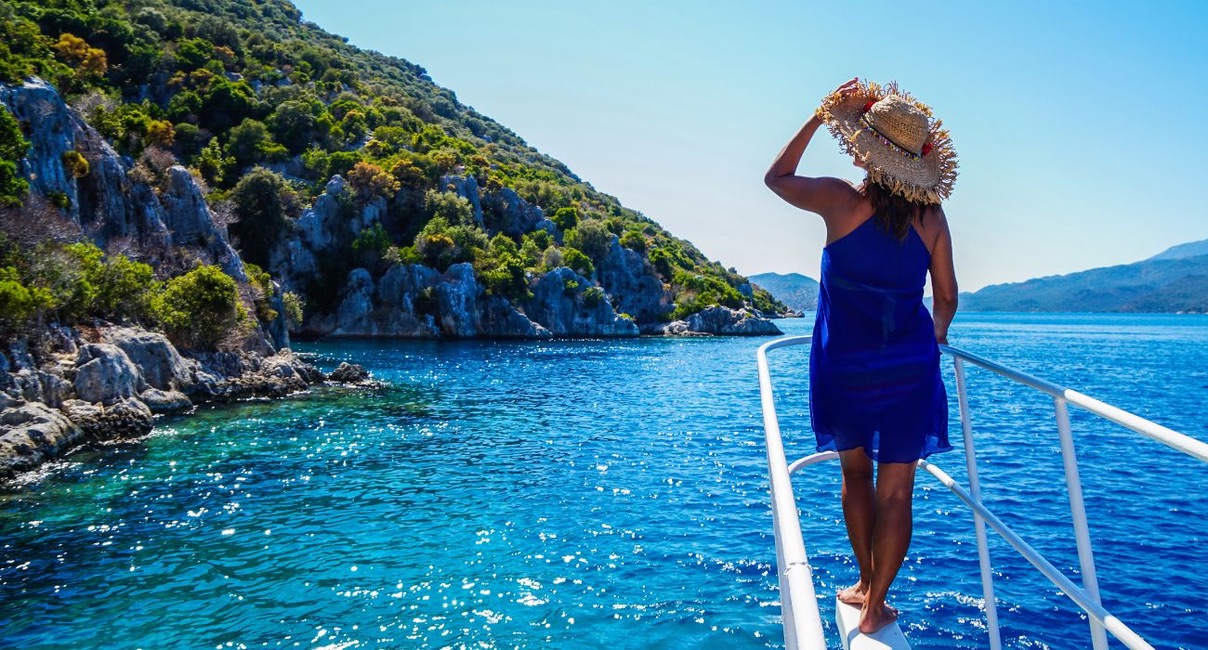
The price
Boat prices may differ based on the time of booking, current offers, discounts for early or last-minute bookings, and other commercial factors. The extra costs in addition to the fixed travel price can be fixed or variable within the limits indicated in the offer itself. If these limits are not indicated in the variations of the extras, the lessor is required to request further information from the ISC team. These variations may potentially affect the extras of the trip itself, for example, the costs of the galley (food and drinks), fuel, and mooring based on the type of cruise you book, you can always request if the estimated amount relating to these costs is not already a specified extra.
Traveler's obligations
The lessor must collect general information relating to health obligations and the documentation necessary for expatriation in the case of trips abroad. In any case, before departure, they will ensure that it is updated with the competent authorities. In the absence of this verification, no responsibility for the failure of one or more travelers to depart can be attributed to the intermediary or the ISC. It is up to the traveler to have a valid individual passport and any other document valid for all the countries touched by the itinerary, as well as residence and transit visas and health certificates that may be required. The traveler is always required to inform the Intermediary and the ISC itself, at the time of booking, of any needs, requests, or particular conditions (pregnancy, food intolerances, disabilities, etc.) and to explicitly specify the request for services personalized.
Cancellation
In general, in addition to the cancellation fee, cancellation costs equal to a percentage of the trip price apply, depending on the time distance of the cancellation from the departure date, as indicated in the cancellation policy relating to the trip. It is advisable to take out cancellation insurance if you do not already have one that has a sufficient margin of coverage. The cost of insurance is to be paid in addition to the agreed package price. If one of the participants renounces the trip, it is possible to introduce a replacement person in his place, in compliance with the relevant travel conditions.
Program changes
Before the start date of the trip ISC which for reasons of force majeure, not deriving from its organization, needs to significantly modify one or more elements of the contract, will immediately notify the traveler in writing, indicating the type of modification and the resulting variation. If the change to the trip relates to an important element of the trip such as the replacement of the vessel itself with another equivalent or superior to the original vessel, the traveler will have nothing to claim.
If the vessel is smaller in size or type than the original one, the tourist will be able to alternatively exercise the right to reacquire the sum already paid or to enjoy the replacement cruise (with any financial calculations in his favor). The evaluation method regarding the replacement of a vessel to define whether it is superior or inferior to the previous one is entrusted to the ISC team and takes into account various factors such as size, year of construction, on-board services, maintenance status, comfort of the cabins, crew services, dinghy, boat model (monohull, catamaran, schooner, etc) and other factors which together determine this evaluation.
Adequate replacement
For any technical malfunction of the vessel, the traveler will have nothing to claim for the first 24 hours of the disruption. The organizer will try in all possible ways to resolve the technical problem. If the malfunction continues beyond 24 hours, the duration of the malfunction from 24 hours onwards will be calculated and the related reimbursement will be paid to the tourist. The amount of the refund will be established exclusively by the team of Intersailclub after having evaluated all the elements available and provided by the tourist himself, the crew, and the owner of the boat.
If the disservice and/or malfunction is not considered a necessary element in the specific cruise and its correct execution or if a valid alternative solution is found; the traveler will not be entitled to any compensation or refund. (Examples: Breakage of the microwave oven and alternative use of the gas oven; The dinghy engine does not start on some occasions and the crew temporarily provides transport using the oars..).
Complaints
If the customer gives rise to complaints during the trip, they must immediately notify the ISC representative and the service operator in writing. Furthermore, the customer is required to do everything possible to help remove the cause of the disturbance and limit any damage. This constitutes a necessary prerequisite for the subsequent activation of any compensation rights and also allows, in most cases, to resolve the situation. Any failure in the execution of the contract must be contested by the tourist during the use of the package by presenting an immediate complaint so that the ISC, its local representative, or the guide can promptly remedy it. Otherwise, the compensation for damages will be reduced or excluded. Intersailclub, having received the immediate complaint from the traveler in writing to the email info@intersailclub.com, will evaluate the extent of the same with all the available elements provided by the tourist himself, the crew, and the owner of the vessel and will evaluate the extent of a possible reimbursement by the holiday organizer. Customer feedback represents a fundamental element in guaranteeing the quality of our service. In the event of complaints or post-holiday feedback, we ask our customers to send detailed and specific comments. The dedicated management team is committed to dealing with every complaint with the utmost care and promptness. However, we inform you that the evaluation of complaints and refund requests may take a longer period, generally starting from 30 working days. This time frame is necessary for an in-depth analysis of every aspect of the complaint, ensuring an accurate and complete response.
Description of the trips
Descriptions of trips and accommodations are naturally subject to alteration and are subjective. The customer is asked to keep in mind that the images of the boats, the structures, the surroundings, etc. may differ at the time of booking or the beginning of the trip and that ISC has no power over the modifications carried out by the owners of the boats following work on the construction site, sources of pollution, etc. that may be in the vicinity of the place of stay. Similarly, ISC has no power over the selection of guests, restaurant seat reservations, sports and event options, etc. in the place of destination, the languages spoken there, the local customs, or the quality of the service or meals offered, and therefore no responsibility is assumed.
We strongly recommend that you read the terms and conditions in full before proceeding with your booking.
Intersailclub team can help you find the perfect boat for your holiday, tailored to your budget.
Contact us for a free quotation and let's make waves together!



